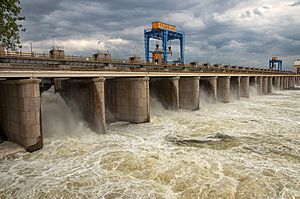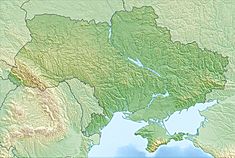Kakhovka Dam facts for kids
Quick facts for kids Kakhovka Dam |
|
|---|---|

The dam's spillways in use in 2013.
|
|
|
Location of Kakhovka Dam in Ukraine
|
|
| Official name | Kakhovska HPS |
| Location | Nova Kakhovka, Ukraine |
| Coordinates | 46°46′34″N 33°22′18″E / 46.77611°N 33.37167°E |
| Purpose | Power, irrigation, navigation |
| Status | Destroyed |
| Construction began | September 1950 |
| Opening date | 1956 |
| Demolition date | June 6, 2023 |
| Owner(s) | Energy Company of Ukraine |
| Dam and spillways | |
| Type of dam | Earth-fill embankment with gravity sections |
| Impounds | Dnieper River |
| Height | 30 m (98 ft) |
| Length | 3,273 m (10,738 ft) |
| Reservoir | |
| Creates | Kakhovka Reservoir |
| Total capacity | 18,180×106 m3 (14,738,766 acre⋅ft) |
| Surface area | 2,155 km2 (832 sq mi) |
| Power station | |
| Operator(s) | Ukrhydroenergo |
| Commission date | 1955–1956 |
| Turbines | 3 × 58.5, 3 × 60.5 MW propeller |
| Installed capacity | 357 MW |
| Annual generation | 1.4 TWh |
The Kakhovka Dam was a very important structure in Ukraine. It was built on the Dnieper River near the city of Nova Kakhovka. This dam was a power plant that used the river's natural flow to make electricity. It also helped bring water to farms and allowed boats to travel easily along the river. The Kakhovka Dam was the last of six large dams built on the Dnieper River.
A road and a railway track also crossed the Dnieper River on top of the dam. On June 6, 2023, a large part of the dam was destroyed. This caused a huge amount of water to rush downstream.
What the Dam Did
The Kakhovka Dam was a big structure with a special lock for boats. It also had a power station that could make 357 MW of electricity. The dam was about 3.2 kilometers (2 miles) wide. Its main parts included a barrage dam, the power station, and the lock.
The dam created the Kakhovka Reservoir, a huge lake behind it. This reservoir was very important. It supplied water to cool the Zaporizhzhia Nuclear Power Plant, which is a very large nuclear power station. The reservoir also provided water for farming in southern Ukraine and northern Crimea through canals like the North Crimean Canal.
Building the dam began in September 1950. The last part of the power station started working in October 1956. The dam held 18 cubic kilometers of water. This is a huge amount, similar to the size of the Great Salt Lake in Utah, USA.
Events During the Conflict
During the Russian invasion of Ukraine, Russian forces took control of the Kakhovka power plant on February 24, 2022. For many weeks, Ukrainian forces used artillery to attack the area. Officials from both sides said that the dam's ability to transport vehicles was damaged. However, the main structure of the dam stayed strong.
In October 2022, there were reports that Russian forces might plan to blow up the dam. This could slow down Ukrainian forces trying to move forward.
On November 11, 2022, a big explosion happened at the dam. Video showed that the road and railway parts were destroyed. But the main dam structure was still mostly okay. Russian officials then opened more gates, letting a lot of water out of the reservoir. Ukrainian officials thought this might be to flood areas south of the dam. This could stop Ukrainian soldiers from crossing the Dnieper River.
By early November 2022, the water level in the Kakhovka Reservoir dropped a lot. It reached its lowest level in 30 years. This put farming and drinking water supplies at risk. It also affected the cooling systems for the Zaporizhzhia Nuclear Power Plant. Between December 2022 and February 2023, the water level dropped by 2 meters (about 6.5 feet).
In May 2023, the water levels in the reservoir became very high. Water even started to flow over the top of the dam. This caused some nearby villages to flood. It seemed this happened because too many gates were kept closed by Russian forces.
Dam's Destruction
The dam's power plant and road were already in bad condition a week before June 6, 2023. On that day, an explosion caused major damage to the central part of the dam. This led to a huge, uncontrolled flow of water downstream. Ukraine's president, Volodymyr Zelenskyy, said there was an "internal explosion" inside the dam's structures. People living nearby had to be evacuated and rescued from the flooding.
Satellite pictures showed that the dam had been getting worse since at least June 1, 2023. The images also showed that the road crossing the dam was damaged by June 2.



